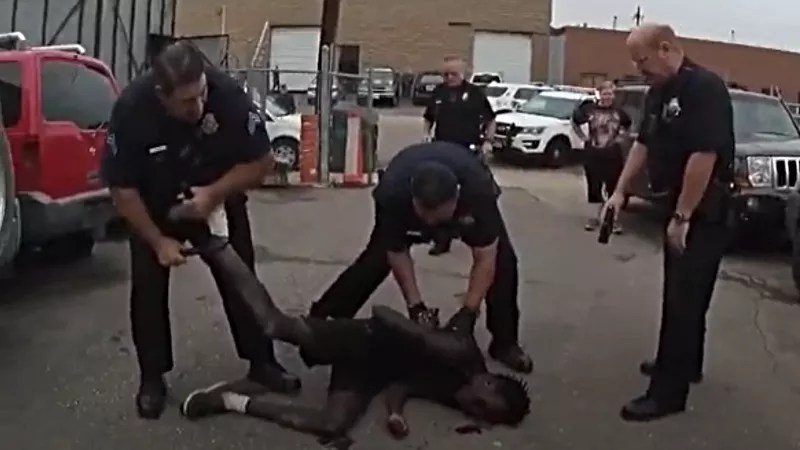
Denver Police Department via YouTube

Audio By Carbonatix
It’s been a bad legal week for the City and County of Denver. Hot on the heels of a lawsuit filed on behalf of Naphtali Israel over a recent incident during which he and his three stepchildren were held at gunpoint by Denver cops in a Safeway parking lot following a highly dubious 911 call, a new complaint has been dropped on former officer Joseph Rodarte for brutally beating a teen suspect who’d been dancing under the influence of LSD.
Like the Israel suit, this one was filed by Denver-based Killmer, Lane & Newman, LLP. And it’s also illustrated by shocking video in which the target of rough law enforcement action is black: Malow Mayek, who was just seventeen during the summer of 2018, when he suffered what the filing describes as “a critical head injury, a fractured nose, and fractures of his right tibia and right fibula” after Rodarte struck him six times with a metal baton.
Attorney David Lane doesn’t seem winded by the one-two punch aimed at the Denver Police Department in recent days. “As long as the cops keep beating people, we will continue to be busy,” he says.
That Mayek came to police attention because of dancing calls to mind the August 2019 attack by Aurora cops on the late Elijah McClain, whose musical moves while wearing a ski mask prompted a citizen’s concern. Lane stresses that McClain was drug-free (until officers injected him with ketamine, which may have contributed to the health crisis that killed him), while Mayek most assuredly was not. But there’s common ground in another respect, he believes.
Like McClain, “Mr. Mayek was doing nothing wrong,” Lane points out. “There was no crime he was accused of committing. There was no anything, and unless the police have a reasonable suspicion that you’ve committed a crime, you’re allowed to ignore them and just walk away. So when he refused to obey them, the officers had no legal justification to lay a finger on him.”
As Lane summarizes what happened on August 22, 2018: “Mr. Mayek was on LSD – not a good thing – and he was out of his mind. He was sort of dancing down the street, tripping and thinking he was the Lord God almighty, yelling things. And the cops got involved. They were ordering him, ‘Stop, stop,’ but he was on LSD, and he continued to dance and carry on. So they decided, ‘When you’re not doing what we told you to do, we’re going to break your bones and electrocute you’ – and that’s what happened. Officer Rodarte broke Mr. Mayek’s leg, broke his orbital bone and broke his nose, all because Mayek wouldn’t do what he told him to do.”
Here’s body-worn camera video of what went down.
The lack of evidence that Mayek had broken the law is key to Lane’s argument. “People don’t have to obey the police if there’s no reasonable suspicion that they’ve committed a crime,” he notes. “If a cop comes up and says, ‘Let me see your ID,’ you can say ‘Go fuck yourself’ unless the cop has a reasonable suspicion you’ve committed a crime. Then you have to give it over – but otherwise, you don’t.”
Prosecutors routinely deem police actions justified no matter how shocking they might seem to the general public, but not this time around. In late 2018, the suit acknowledges, Denver District Attorney Beth McCann criminally charged Rodarte with “second degree assault for unlawfully, feloniously, and recklessly causing serious bodily injury to Plaintiff by means of a deadly weapon.”
On October 2, 2019, Rodarte was acquitted after a jury trial – but he resigned from the Denver Police Department in May, before he could be fired. Two other officers involved in the matter – James Martinez and Douglass Watson, who are also named as plaintiffs – received ten-day suspensions for tasing Mayek after he’d ceased to be a threat.
“My hat is off to Beth McCann,” Lane says. “She at least tried to see that justice was done.”
Nonetheless, Lane feels that merely losing his job isn’t appropriate compensation for what Rodarte did to Mayek. “Yes, he was acquitted, but so was O.J. [Simpson], and in the civil suit, O.J. was found liable,” he points out. “So now, Mr. Rodarte can hopefully receive a little justice from a civil jury.”
Click to read Malow Mayek v. City and County of Denver, et al.